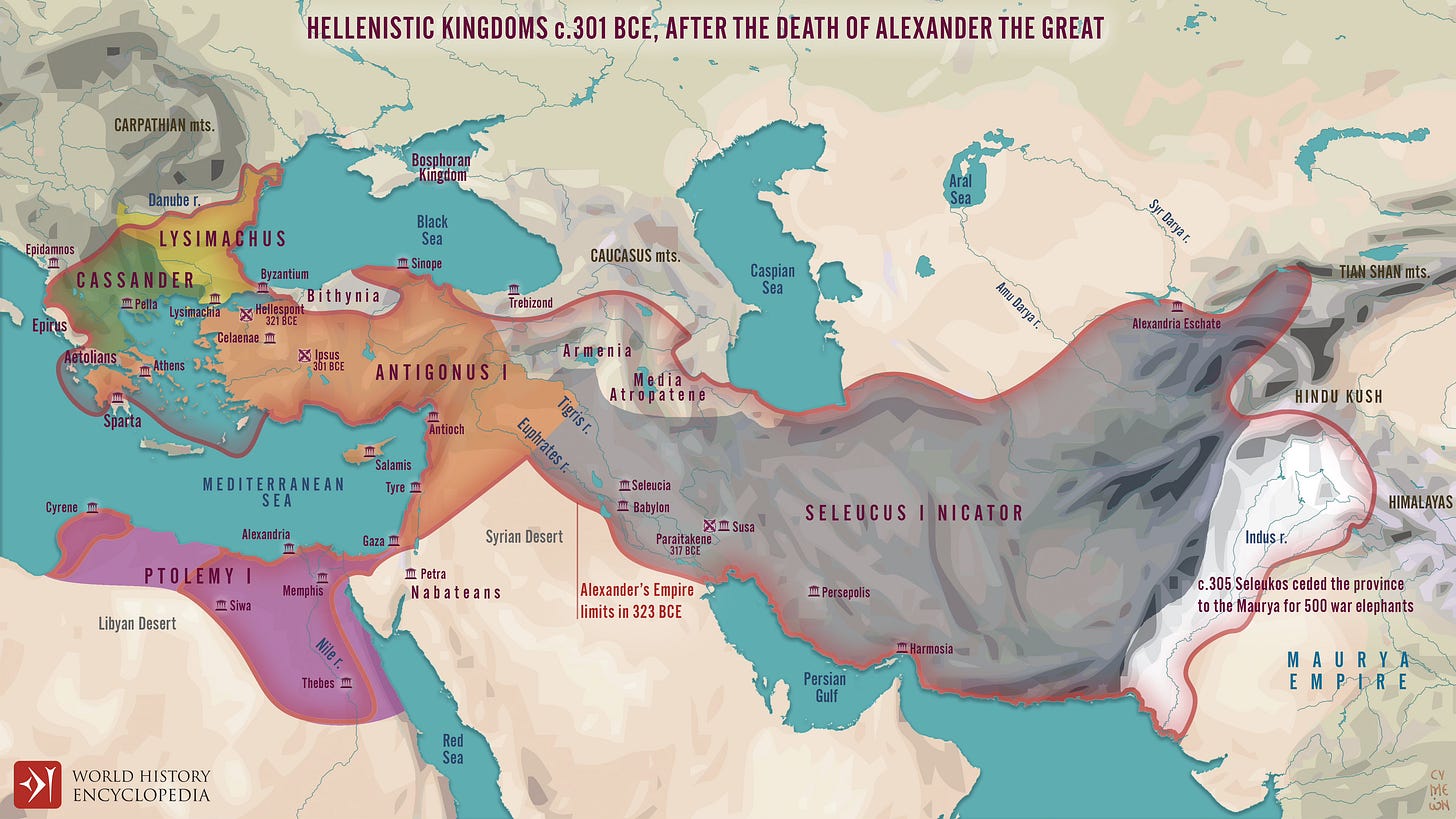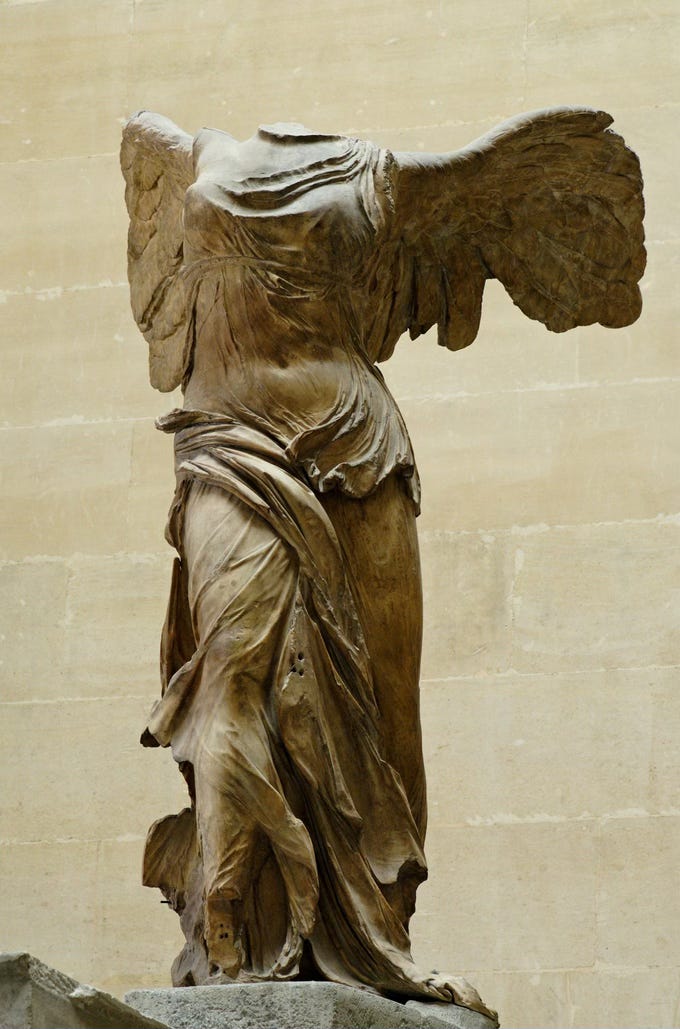Hellenism, the twilight of Greek ascendancy
Review of Alexander to Actium: the Historical Evolution of the Hellenistic Age by Peter Green
The book begins with the sudden absence of an over-powering personality, Alexander the Great. At the moment of his death, he had smashed the remnants of the autonomous Greek city states (the polis) and carved out the largest empire that antiquity had then known. Unfortunately, he had left neither a clear idea of how his empire should be governed nor named a successor in any provable way. As a result, about 6 of his top Macedonian generals began to compete in the "funeral games" to take over from him. Ptolemy, the only one shrewd enough to see that it was better to occupy a defensible and self-sufficient chunk of the empire - he chose Egypt - was to establish the most lasting dynasty of these men. Nonetheless, Antigonous wound up with the old Greek mainland and Macedonia and Seleucis took the ill-defined Asia Minor expanses; for the next 3 centuries or so, their heirs would fight a desperate, defensive battle to keep their territories intact from encroachments by barbarians and Romans. Only the Ptolemies would operate in near safety (which led them to epically nasty intriguing against each other, but that is a long story).
In political science terms, all three of the new empires were run as the privately owned fiefs of their kings, simple despotic autocracies for their pleasures. This marked the end of a fabulous period of experimentation in modes of government as well as culture, i.e. the brief, uniquely beautiful flourishing of classical Greek culture was gone forever. As the polis died, so did many of the communal ideals of their citizens. Rather than contribute to the glory of their cities, under the authority of faraway kings they withdrew into their own private worlds, Hellenes sought to amass wealth and keep their privileges but fearing Tyche, or the unpredictable God of Fortune. As a result, much artistic culture became stultified into copies of past masterpieces or took on a more personal, realist cast of identifiable individuals rather than the ideal types and Gods of the past. This was true, too, for the philosophies (stoicism, cynicism, epicureanism, and skepticism) that emerged: they concentrated on finding freedom from anxiety and pain rather than contribute to the betterment of society. Interestingly, as Hellenes, the 3 dynasties maintained a relative isolation from the local cultures, absorbing aspects of them only very, very slowly. Cleopatra was first Greek and only secondarily Egyptian.
One of the most interesting topics covered is the failure of the Greeks to develop experimental science in spite of their high civilization. First, the Greeks (and later the Romans) scorned "lower" professions that involved physical exertion, so get-your-hands-dirty experimentation was out; they also lacked precision instruments, any idea of statistical variance in observations, and failed to systematically record the observations they did make in verifiable and communicable records. Anything practical, such as the military devices that Archimedes invented to protect Syracuse from the Romans, were products of necessity and otherwise little valued.
Second, they preferred to speculate on and build over-arching theoretical systems, which were largely sterile without independent experimental verification by peers.
Third, in this period the elites became deeply interested in astrology, divination, and mystery cults at the expense of the schools of rationality associated with Plato and Aristotle.
Fourth, with a static, slave-based economy, innovations that saved labor - liberating people to have more time and energy to think - were viewed as disruptive and hence, under-valued. Nonetheless, there were many advances in this period, such as the founding of the libraries of Alexandria and certain medical innovations that the Arabs would discover and develop. Though also rather sterile, they are signs that Hellenistic culture was not completely decadent. It was not until the Enlightenment that all of these strands came together as the modern scientific method.
The concentration on this cultural period filled a significant gap in my perception of classical civilization. It was at this time that the less cultured Romans - they were too busy perfecting a military machine that would enable them to conquer and manage the known world for over 400 years - became impressed with Greek culture and sought to adopt it. With the Romans on the book's periphery, rising as they were, I got a very different (and highly detailed) view on the decline and absorption of this incredible civilization into a more brutish empire.
Green’s book is a Kulturgeschichte, a 360-degree portrait of the “ideas in the air” in a given historical moment and culture. It is supposed to be scientific, a complete explanation bringing together economic, social, and intellectual movements. As the foundational period of Greco-Roman culture, not only is it essential to know, but Green writes with a literary elegance and subtlety that are a constant pleasure.
The book is chock full of amazing characters and related cultures, from the Jews to Cleopatra. Though this is not a narrative history and it is better to already know the traditional stories, Green alludes to these people with vivid images and many wonderful illustrations and excellent maps.
A word of warning to the general reader. This is an advanced text, at the high undergraduate level or beyond, and solidly academic. While it is not a thesis-turned-book that seeks to argue dull academic proofs and the like, it strives to present a comprehensive picture in a scholarly manner - over 1/4 of the book is footnotes and references. This will put many people off, as will the foreign words that frequently pop up. However, for those familiar with this world, this book is an indispensable masterpiece that will define scholarship on this period for many generations to come. The reader should be well versed in Roman and Greek Classical history, e.g., if you know who Sulla and Mithridates were, you will be able to revel in Green's interpretations and references to them and many others.
This is personal, but I found the book to be an utterly spell-binding intellectual adventure, putting it in a class by itself. Green often makes observations that are profound, even beautiful. For example, on an extended discussion of the slave economy, he mentions that we were unable to finally eliminate it until industrialization liberated us from menial tasks. There are many instances of this kind of philosophical observation that will speak to each reader personally. I also loved Green's writing style. Recommended with the greatest enthusiasm. This is a great book, a classic.






The INVENTED-by-the European-GRECOPHILES (PHILHELLENES) "Hellenistic" Age is for the ACTUAL MACEDONIAN Age. This is the period when the MACEDONIANS ruled in the three parts of the MACEDONIAN Empire which was divided after the death of Alexander III of Macedon, and eventually were conquered by the Romans, with the help of the "Greeks", who allied themeselves with the Romans.
Plybius - Book 18 of his Histories:
Reciting the Macedonian king Filip V Antigon:
" ... But what is most outrageous of all is that they (the Aetolians) should
attempt to put themselves on the same footing as the Romans and demand that
the MACEDONIANS WITHDRAW FROM THE WHOLE OF GREECE. ...In any case, he
continued, "WHAT IS THIS GREECE which you demand that I evacuate, and HOW DO
YOU DEFINE GREECE? Certainly MOST OF THE AETOLIANS (the Aetolian league)
THEMSELVES ARE NOT GREEKS. The countries of the AGRAAE, APPODOTAE and the
AMPHILOCHIANS CANNOT BE REGARDED AS GREEK. So do you allow me to remain in
these territories?"
Have you read The Horse, the Wheel, and Language: How Bronze Age Warriors from the Eurasian Steppes Shaped the Modern World, by David W. Anthony? It’s a very well researched and written account of the origin and spread of the Indo-European language family beginning on the Pontic-Caspian Steppes and correlated with the domestication of the horse and the invention of the war chariot. Spans the Neolithic to the early Bronze Age. A detailed survey of the archaeology of the region plus original research on horse domestication.